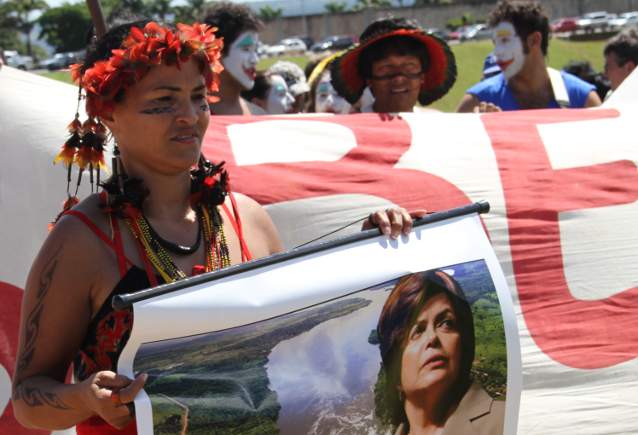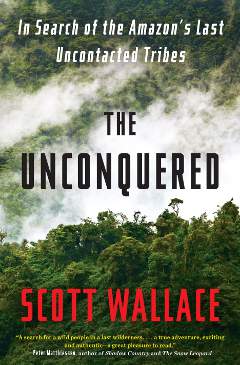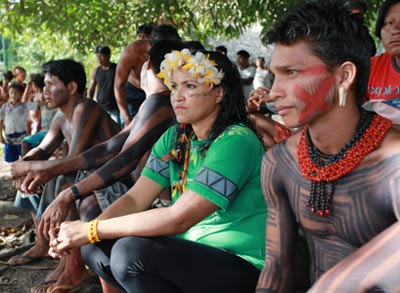Eye on the Amazon: The Official Blog of Amazon Watch
Bolivian Indigenous March a Success
President Morales cancels road through TIPNIS reserve
October 22, 2011 | Andrew Miller, DC Advocacy Coordinator, and Diana Garzón, Advocacy intern
Yesterday, Bolivian President Evo Morales announced that he would cancel the road project that previously was planned to cut through the heart of the TIPNIS indigenous reserve in the Bolivian Amazon. This followed the Wednesday arrival in La Paz of hundreds of Amazonian indigenous protesters.
Over the course of 65 days, the marchers suffering health problems, cold, fatigue and even violent police repression on September 25th. They were undeterred, however, and garnered increasing national and international support as they steadfastly walked to the country's capitol city. Upon arrival, several hundred settled into Murillo Plaza where they waited to meet with President Morales and have a true dialogue about the construction of the TIPNIS road.
On Saturday, President Morales and his cabinet entered into direct negotiations with leaders of the protesters. According to Bolivian news sources, they concluded that a joint commission will visit the TIPNIS reserve, within 30 days, to inspect the current situation and to expel illegal colonists within the reserve.
Also, as of this coming Monday, the Bolivian Congress will convene to review the law, passed by the Bolivian Senate on October 13th, which attempted to deal with the situation. The new version should void the so-called second section of the Villa Tunari – San Ignacio de Moxos road.
"The Amazon is Life"
Q&A; with Sheyla Juruna, Indigenous woman warrior from the Brazilian Amazon
October 20, 2011 | Leila Salazar-Lopez

If you've heard of the Belo Monte Dam and have signed a petition to stop it, you've probably seen a picture of Sheyla Juruna, Indigenous woman warrior from the Xingu River Basin of the Brazilian Amazon, who's spent the last 20 years working to stop this dam from being built on the Xingu River in the heart of the Brazilian Amazon.
Sheyla was recently in the United States on a tour of NY, DC and San Francisco to expose what she calls, "the project of death" and make appeals to activists, concerned citizens, foundations and global leaders to support the struggle to defend the Amazon and our entire planet from unchecked and unsustainable "development" that will decimate Indigenous peoples, the true stewards of the Amazon, unless we stop it and promote alternative development and renewable energy for ourselves and our future generations.
During her visit Sheyla spoke at various public events including the Amazon Watch 15 year anniversary luncheon and an evening presentation at the Earth Island Institute. Before she returned to Brazil, I had a chance to ask some specific questions to better understand what was really happening on the ground in Altamira and what we can really do at this time to show our support.
Available Now: The Unconquered: In Search of the Amazon's Last Uncontacted Tribes
New Book about Uncontacted Indigenous Peoples in the Amazon
October 19, 2011 | Andrew E. Miller
Yesterday was the launch of a book that I have been waiting eight years for. You see, back in 2003 I read a National Geographic article that was unlike anything I had ever read before. It dealt with an expedition, deep into the farthest reaches of the Amazon, to look for but explicitly not contact an indigenous tribe. The notion of leaving them "uncontacted" turned the violent 500-year history of our continent on its head.
Now that same expedition is detailed in a new book by author Scott Wallace. A number of media outlets have recently published articles about Scott and the book, like this profile in Salon.com. We hope you'll review these materials, order the book, and check out Scott on his upcoming speaking tour.
Uncontacted groups pose a powerful counter-point to the notion that civilization and modernity are the best path for all people. We have over five centuries of evidence about what contact implies for any indigenous group: an initial decimation of population through violence and disease, a direct attack on their cultural, spiritual and linguistic norms, and often enduring impoverishment. What would our reaction be to the invasion of aliens if we knew this would be our collective fate? If Hollywood is any indication (e.g., Battle: LA, in which the aliens are in search of natural resources to plunder), we certainly wouldn't embrace it. Uncontacted groups are the personification of the "fight or flight" reaction of humans to traumatic circumstances.
Though Scott's expedition was in 2002, the issue is increasingly relevant today. As roads and natural resource extraction projects – both illegal and state-sanctioned – push deeper into the rainforests, they pose a mortal threat to the uncontacted groups in question. Think of these people as the guardians of some of the last pristine and bio-diverse natural areas in the world.
The Privilege of Working with Indigenous Rainforest Guardians
Part III
October 17, 2011 | Hank Edson, AW Volunteer

In celebration of Indigenous Peoples Day last week, I have been blogging about the role of indigenous peoples in the global environmental movement. I first discussed the many reasons indigenous peoples are a leading force in the global environmental movement. Part II in the series focused on a visionary contribution indigenous peoples are making in advancing the legal rights of nature and I called attention to two examples of how indigenous rights can be violated by those who champion the rights of nature: the recent violent suppression of an indigenous protest march by the government of Bolivia and the REDD (Reducing Emissions from Deforestation and forest Degradation) movement's failure to recognize and protect indigenous rights. Today, I want to tell you about the work Amazon Watch is doing to steer Bolivia and the REDD movement in a wiser, more humane and more effective direction.
As noted in last week's post, on September 25th the Bolivian government violently suppressed a 400-mile protest march by the indigenous communities being directly affected by the construction of a highway through their land, also a national park, without their consent. Aware of the mounting tension over the highway's construction, Amazon Watch co-authored and delivered a letter to the Bolivian government four days before the violence broke out. The letter was signed by 60 other leading international environmental organizations and asked the Bolivian government to respect the rights being asserted by the indigenous protestors.
In making this request, the letter discussed at length Bolivia's history of leadership and its important present role in the global environmental and nature rights movements. The letter also detailed at length the interwoven environmental and social consequences of violating the rights of the indigenous communities threatened by the highway's construction. Given the large number of resignations resulting from the government's violent conduct and the subsequent halt of the flow of funding for the highway project from the Brazilian National Development Bank (BNDES), the Bolivian government probably wishes it had taken the Amazon Watch letter more seriously to heart.
The Privilege of Working with Indigenous Rainforest Guardians
Part II
October 13, 2011 | Hank Edson, AW Volunteer

Yesterday, I blogged about a number of reasons indigenous peoples are a leading force in the movement to achieve balance and harmony in human society's relationship with the environment. An important example of Amazonian indigenous leadership with respect to the environment is its contribution to the Rights of Nature movement.
In 2008, Ecuador adopted a new constitution that includes a chapter specifically devoted to the Rights of Nature and that establishes as a principle of law that "Nature or Pachamama, where life is reproduced and exists, has the right to exist, persist, maintain itself and regenerate its own vital cycles, structures, functions and evolutionary processes." The Ecuadorian constitution also gives nature "the right to be completely restored." Under the Constitution's Rights of Nature chapter, the government of Ecuador is obligated to take action to ensure the protection of these rights and the Ecuadorian people are given the right to benefit from the environment. These provisions give legal expression to the indigenous understanding of Pachamama as a living entity in itself that also embraces all living beings, all of whom manifest the same dignity and command the same rights as human beings intuitively recognize themselves to possess.
Ecuador's triumphant expansion of rights to include Pachamama was followed in January 2010 by Bolivia, which passed the world's first law granting nature equal rights with humans. In April that same year, Bolivia hosted the World People's Conference on Climate Change and the Rights of Mother Earth. The highlight achievement of this conference was the adoption of a "Universal Declaration of the Rights of Mother Earth." Bolivia then submitted the Declaration to the United Nations with the hope that it will be adopted as a companion to the United Nations' Universal Declaration of Human Rights.





